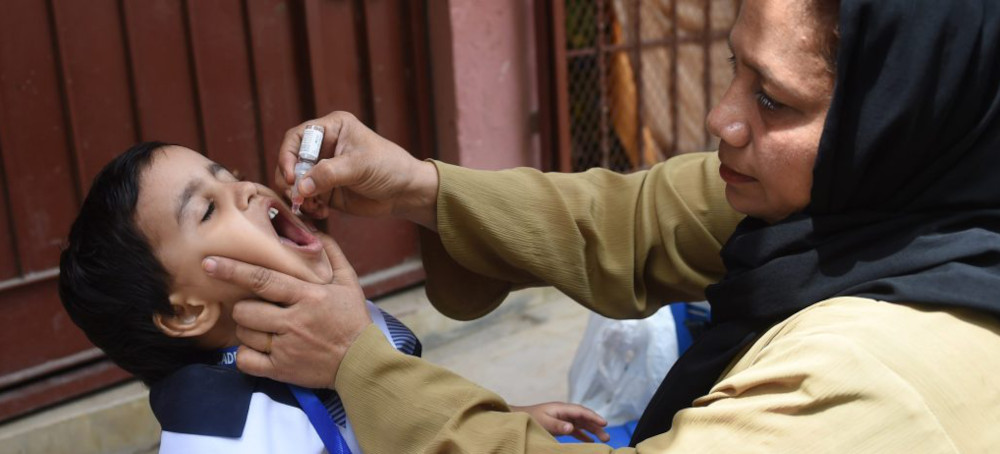Bill Gates’ Warning to Donald Trump: ‘Kids Will Die’
Alexa Mikhail Fortune Unless the U.S. restores international aid that has been cut, Bill Gates says, it will be even harder than he expected to eradicate polio. (photo: Rizwan tabassum/Getty)
Unless the U.S. restores international aid that has been cut, Bill Gates says, it will be even harder than he expected to eradicate polio. (photo: Rizwan tabassum/Getty)
ALSO SEE: Pien Huang | Former CDC Staff Warn of 'A Five-Alarm Fire'
After a friendly dinner this past winter at Mar-a-Lago with incoming President Donald J. Trump, after which he told interviewers he was “frankly impressed” with Trump’s interest in global health, Gates now says that we find ourselves in an “abrupt and negative situation.”
The new administration’s cuts to international aid “will cut kids off from vaccines, and kids will die” he told Fortune in a late-April interview. “It’s been cut very dramatically, and very differently than what I expected,” he said.
Already, he said, he is hearing about devastating effects of the federal aid cuts via the Gates Foundation. “We’ve got offices in Africa, and we can see things where HIV medicines are no longer getting to people, and staff have been let go,” he said. “Trials have been interrupted. Babies are getting infected with HIV.”
In the interview, to discuss the Gates Foundation’s plans to ramp up its spending on global health to $200 billion over the next 20 years before shutting down operations, Gates said his efforts to eradicate polio and malaria and to dramatically decrease deaths from tuberculosis and HIV/AIDS could be undermined by the government’s cuts—but he has some hope that these cuts will be temporary, and that U.S. funding will be restored in four to 10 years.
“I happen to believe that we’ll have some success in getting aid funding restored,” he said. “We’ll see. You know, that could prove to be naive.” He even suggested that perhaps the administration’s aid pullbacks were made without full knowledge of their likely effect on the fight to eradicate polio and other diseases, explaining, “I don’t think that’s intentional on their part.”
It remains to be seen how the American public responds to the cuts, but they may be more supportive of government spending on international aid than Trump’s administration believes, Gates suggested. “Many people think aid budgets are much higher than [they are],” he said. “And when you say to them, ‘What do [you] think it should be?’ they’ll be like, ‘I think it should be 2%, not 5%.’ And we’re like, ‘Well, we have good news for you. Even before the cuts, it was less than 1%. So, you know—stick up for child survival!’”
He framed the problem in terms of a lack of knowledge and empathy. “It’s hard, because most people don’t get to see this work,” he said. “As humans, if you go and see a malaria ward with kids dying, you would be very affected. If you see mothers bleeding to death, you’d be very affected.”
Even if the money is restored, the current pain is real. Estimates from a recent USAID memo predict that the world’s deadliest infectious disease, TB, could increase by 30% within a year if cuts to aid are not restored. For malaria, cases could rise by 15 million in that same timeline.
The Global Alliance for Vaccinations and Immunization (Gavi), a collaborative effort between nations, pharmaceutical companies, and NGOs designed to get life-saving vaccines at cheap prices to vulnerable populations in poor countries, will get significantly fewer donations at their annual event, Gates predicted.
Gates has become one of the most renowned philanthropists of his time, creating the world’s largest private philanthropic entity in the Gates Foundation. But even his billions can’t make up for the pullbacks in government aid, he said: “In no way do we view the philanthropic people as substituting for the government money.”
In a February interview with Fortune, Gates said he was confident that polio was one of the diseases that could be eradicated within the 20-year deadline for his foundation. Given how close the disease is to eradication—only 10 new cases of wild polio were reported this year worldwide—he felt at the time that he was on firm ground making that prediction.
“I wouldn’t have expected that polio would be in question,” Gates said in April. But the Trump administration’s funding cuts have made Gates less certain of success. “I’m surprised that here we are, two months later, and I’m having to temper my polio statements a tiny bit,” he said, explaining that the U.S. had been an essential part of the plan to eradicate the disease for good: “They’re just key, both financially and in their influence.”
Ultimately, Gates said, he remains hopeful about progress in global health. “Because of the acceleration of innovation, including AI both for discovery and delivery, I’m still very optimistic that we can make amazing progress,” he said. “We have to up our game, because the value involved—of helping other human beings—I don’t think that’s changed.”



